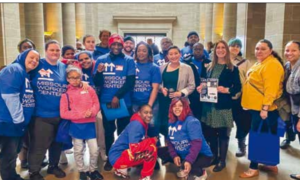Reform or Recidivism: the case for expungement
By Gary Thomas
America’s burgeoning prison system is a danger to our own country and the labor movement. Especially when the government owns corporations. Unicor is a wholly owned government corporation that makes office furniture, corporate uniforms for fast food companies, such as McDonald’s, law enforcement and military equipment.
Unicor boasts that nearly 25% of the Inmates that participated in the program have reduced recidivism (returning to prison) but the actual number is that more than half of those inmates return to prison in less than a year. All while making the company a net profit of 300 million dollars.
You may ask how does labor play into this? With pay rates as low as .23 cents and soaring to $1.03. Unicor can outbid any American workforce and are often subcontracted by big corporations charging exorbitant fees to the taxpayers only to have what amounts to captive slave labor make those products.
Low wages, improper training and no safety assurances help our own government drive the small American business out of the market. Don’t do the crime if you can’t do the time, right? Wrong. Drug charges make up the bulk of our prison population. While we like to believe we are taking drug pushers off the streets, we are giving jail time for recreational use amounts of drugs.
The drug that tops that list: Marijuana.
Theses drug laws are often focused and enforced on the poor and minorities. Overworked courts and equally overworked courts appointed lawyers are
all too ready to make a deal. This keeps a supply for ready-made cheap slave labor always in stock.
If they don’t like it, they can change it. No, they can’t.
Statistically a poor person has a better chance of winning the lottery than moving into more than one tax bracket above their current station. Couple that with prison systems, courts and law enforcement agencies primarily focus on the minority members of our society and once a poor person is convicted of a Felony, they lose their right to vote while incarcerated. Again, this ensures a steady stream of slave labor supplied to the prison system.
If we were honest about wanting to rehabilitate and reduce recidivism in the prison population then steps should be taken to provide a living wage to inmates with all restitution paid first and foremost to the victims of any criminal activity. Upon successful completion of rehabilitation, criminal activity purged from record. Not to mention full voting rights kept while incarcerated.
Any work done by Unicor for American businesses must be publicly acknowledged on the item in question being built. Visible enough to be read easily.
Skilled trades classes should be made readily available and paid for, wholly, by Unicor. This will reduce recidivism by allowing individuals to leave the prison system with a means to purchase goods and services that benefit the American workforce and to provide for themselves in a way that benefits
society. Thus, elevating those individuals out of poverty.
The same can be said about record expungement for non-violent felony offenses. Fran Marion, a leader of Stand Up KC and a Taco Bell employee, served a prison sentence for cashing a $700 stolen check. While incarcerated, Fran paid her restitution and served her sentence without incident. On her return to society, she found limited employment prospects. Most businesses wouldn’t hire her and the companies that would pay poverty wages.
“ I did my time, I paid back both society and the victim. I was, I am, poor and I made a choice out of despair. Now, because of that choice, I am serving a life sentence of poverty. Poverty will trap my children and expungement of my record will set them free from a crime they never committed.”
Fran is exactly right. We talk of generational wealth; the ability to buy a home, have a pension or 401k, to leave something to our dependents when we pass. What we never talk about is generational poverty. How rules and laws passed against the working class keep a steady supply of low wage workers toiling their life away. Never earning enough to send their children to better schools. Which prohibit those who might have lived in poverty to truly fight the conditions of poverty. The cycle repeats from generation to generation just as wealth transfers to old money surname to old money surname.
With over 1.9 million adults with records in Missouri, the time is now to clear as many records as possible. Our communities struggle to fill jobs. A person with a past criminal record may be the perfect candidate, but unable to access this job because of a past charge. Within one year of record clearing, people are 11% more likely to be employed and earn an average of 22% higher wages.
Those who employ the working class know the truth of the saying “A rising tide lifts all boats.” Meaning as wage increase for one sector, they increase for all sectors. They also know the opposite to be true. If wages can be depressed in one sector, they can be depressed in all sectors, including ours.

